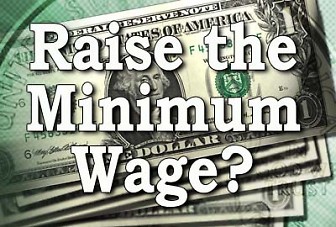Minimum wage is the lowest hourly rate an employer can legally pay their workers. There is a federal policy which currently defines minimum wage at $7.25 which was put in place July 24, 2009. States are also able to define their own minimum wages, although not all do. An employee is subject to both laws if in place, and although the supremacy clause in Article VI of the Constitution grants dominance to national laws, in this instance the employee is entitled to the higher minimum wage of the two policies. As of February 24, 2015, there are 29 states that have higher minimum wages limits than the federal government. Initially, these laws were put in place in order to reduce poverty, and to protect younger workers and minorities from being paid less than others. Increasing the minimum wage is currently in debate, although to a lesser scale than other issues currently on the table.
Those in favor of increasing the minimum wage feel that a higher minimum wage would ensure that workers in those positions would not be underpaid and given a fair wage. They also feel that it would put more money into the economy, thus stimulating it since lower-paid workers are able to spend more. Another benefit is to encourage a better work ethic since the pay is better, and to encourage those that are unemployed to search for now more-desirable minimum wage jobs.
Those opposed to the minimum wage increase believe that it would actually cause more poverty, since business would then have to pay more in wages, they may have to let employees go in order to afford the new wages. There are also studies available that show that minimum-wage workers are typically high-school kids in their first job rather than impoverished families living off of the minimum wage income. Others believe that it would cause inflation which would cancel out the increased amount of money in the economy, providing no benefit. There is also some concern that it would discourage further education of the poor.
One of the core values of the United States’ political culture is individualism, which is a commitment to personal initiative and self-sufficiency. Self-sufficiency is tied to a desire for economic independence. I believe that Americans wanting a higher minimum wage are in part holding to the belief of their economic independence as so not to feel like they have to rely on the national or state government for aid in just trying to provide basic needs such as food, shelter, and heat.
The concept of majoritarianism occurs when political leaders respond to the policy desires of the majority. In 2014, Alaska, Arkansas, Nebraska, and South Dakota approved minimum wage increases through ballot measures, which relied on voters making the decision to change the policy. This is a very good example of majoritarianism since it directly relied on the voters themselves to change the policy. It is also an example of a democratic change since it came from the people. Other states that have recently made changes to their minimum wage laws were made by the elected lawmakers in office to make the decision, using the representative government in place.
